NOTE: We had a great training recently on booking more gigs through your website and it’s now available for FREE on YouTube…
This week’s Educate and Entertain post is part of a series that’s all about increasing the effectiveness of your website through some easy fixes, tweaks, and suggestions.
Fix #1 addresses social proof: what it is, and three powerful ways to leverage it on our sites to generate bookings.
And one way NOT to.
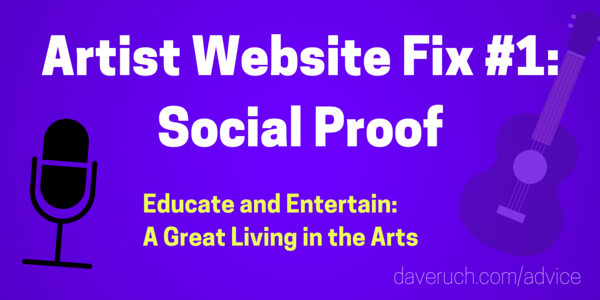 According to Wikipedia, social proof is:
According to Wikipedia, social proof is:
“a psychological phenomenon where people assume the actions of others in an attempt to reflect correct behavior for a given situation. This effect is driven by the assumption that surrounding people possess more knowledge about the situation.”
Huh?
OK, it might be easiest to reverse engineer this and think about what happens when we’re the ones shopping for something.
(After all, the venue that’s considering you for a gig is “shopping,” aren’t they?)
 How Social Proof Works
How Social Proof Works
Let’s assume we’re looking around online because we need to buy a new space heater.
When there’s no obvious “best” answer, and we’re presented with a dizzying range of options, what do we do?
We try to determine what other consumers have done.
We look at ratings, customer reviews, authoritative quotes, first-hand testimonials, satisfied customer lists.
We’re searching for evidence that others have used, and been happy with, the product or service.
 That’s social proof.
That’s social proof.
How To Use Social Proof on our Websites
It’s pretty easy to transfer this to our own situations as performers.
Quite simply, the more evidence we can provide that…
a) we’ve been booked often by other quality venues
b) the people who’ve hired us have been delighted
c) our audience members love what we do
…the easier we’re making it for the venue to choose us for the booking.
In fact, 84% of consumers put as much trust in online reviews as they do in a personal recommendation, and personal recommendations have always been the strongest driver of purchasing decisions.
So, let’s put the social proof front and center on our websites (and all of our promotional materials, for that matter).
After all, we may not have very long to establish trust and credibility before our website visitor moves on.
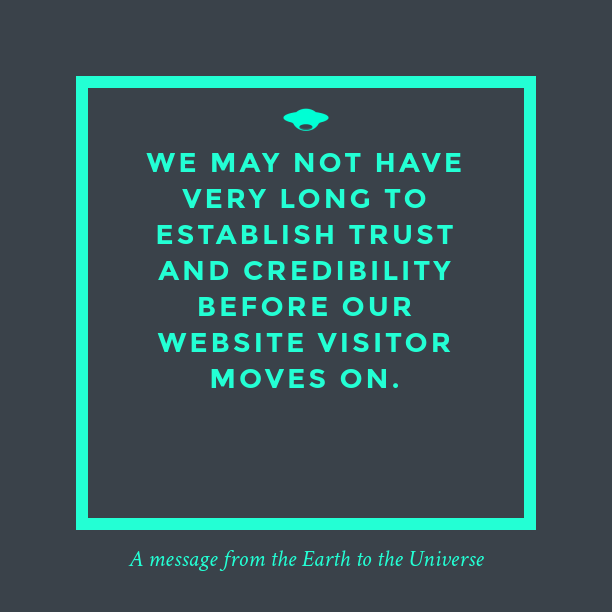 Here are three effective ways to strengthen the marketing power of your website using social proof:
Here are three effective ways to strengthen the marketing power of your website using social proof:
#1. Testimonials
Customer testimonials are absolutely central to increasing the likelihood of getting booked in the kinds of places you want to work.
“Dave Ruch just said a really important thing there”
– Dave Ruch
Ask for one from every single person who books you for the kind of gig you want to be doing more of.
Testimonials add reassurance and credibility, and can even serve as “word of mouth” (the best kind of advertising) when the person considering you actually knows or knows of the person being quoted.
How to get testimonials
If the person who hired you has nice words to say after your performance, ask them if they’d be willing to put a few sentences in writing.
 Better yet, pull out your smartphone and get a quick little informal video, or take a quick picture to go alongside their quote if they don’t mind.
Better yet, pull out your smartphone and get a quick little informal video, or take a quick picture to go alongside their quote if they don’t mind.
(Faces always strengthen customer quotes.)
I’ve made it a habit over the last twenty years to ask for a letter of recommendation as a standard part of my “Thank You” letter to clients, and as a result, I’ve compiled in excess of 4oo letters and emails that I can draw from in various ways depending on my needs.
You’ll get lots of good quotable quotes just by saying something like this in your parting letter or conversation:
If you’d be so inclined, I’d love to have a few words from you as to how the performance went from your perspective. These are really valuable to me when I approach other venues who may not be familiar with my work.”
How to use testimonials
One great use for the testimonials you gather is to sprinkle them around your site on the pages that are most germane to the quote.
You’ll want to use the strongest and most authoritative quotes you have, thinking strategically and keeping an eye out for places where you can support a claim you’ve made with someone else’s words.
Here’s a screenshot from a page on my site, with good quotes backing up statements I’m making about myself.
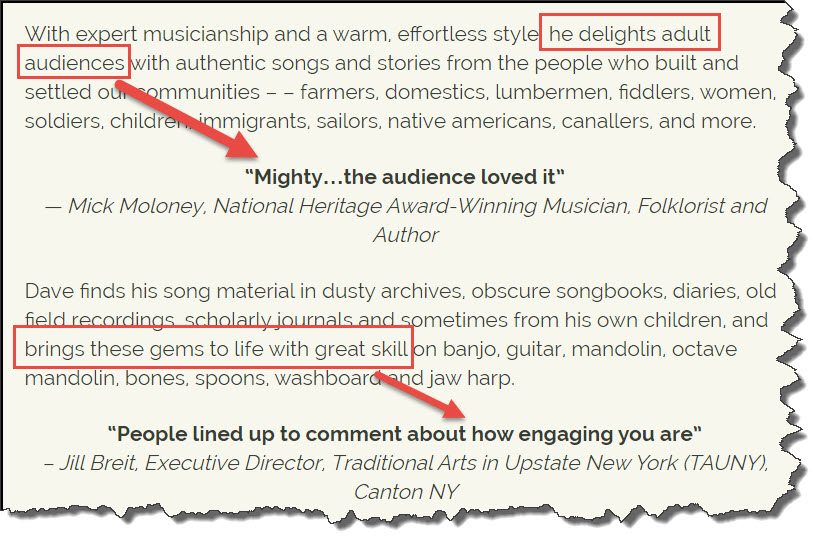
Once you’ve got enough of them, consider creating a user-friendly list organized by state or type of venue like the Hill Brothers do:
 That’s a LOT more useful than “here are all the great things anyone’s ever said about me.”
That’s a LOT more useful than “here are all the great things anyone’s ever said about me.”
Do you send physical packages to potential bookers? Another great way to use testimonials is to simply photocopy a large stack of them and send them along with your other materials.
You can also post images of entire letters on your site with little effort.
How NOT to use testimonials
Whatever you do, don’t do what so many of us have done over the years and throw all your testimonials on a separate page of your website called “What People Are Saying,” or “Testimonials.”
Why not?
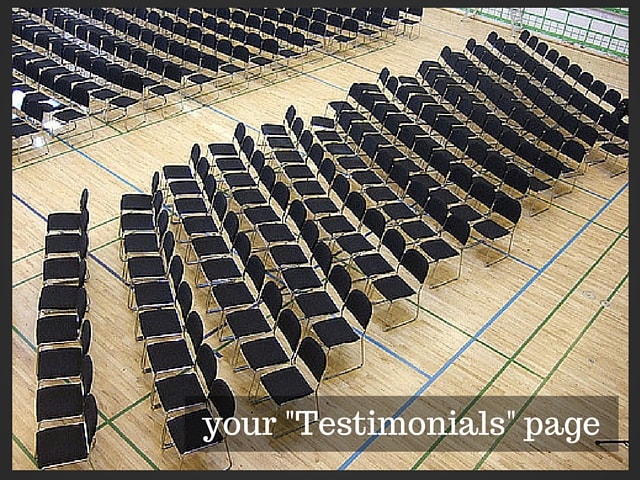 Because nobody goes to that page.
Because nobody goes to that page.
Testimonials on a testimonials page just smells like marketing, and who wants to look at marketing?
A far better use for these golden nuggets is to put them where people will see them, spread throughout the main pages of your site.
#2. Client Listings &/or Logos
Lists of venues you’ve performed for and/or logos of those places make great social proof.
Haven’t played too many places yet? Take the best one or two gigs you’ve done and try something like “as seen at The Roseville Theater.” Of course, a quote from the Roseville Theater right underneath that statement would be ideal!
Played lots of places already? Awesome. Consider placing a big long list of venues at the end of the page that describes your performances (ex – “Thanks to ABC Theater, XYZ Performing Arts Center, etc. etc. etc. for inviting me to perform.”)
Nobody’s ever going to read through that whole list, but the bigger and longer it is, the more reassuring that can be for the buyer.
 Organize that long list of quotes alphabetically, either by venue name or city/state name if appropriate, so people can quickly find venues that are known to them.
Organize that long list of quotes alphabetically, either by venue name or city/state name if appropriate, so people can quickly find venues that are known to them.
Similarly, if you’ve been doing this a long time, highlight that.
I love what entertainer Nels Ross does on his site with the “23 YEARS OF JOY…and counting” graphic:

Do the kinds of places you play have logos? Think about placing several of those as a graphic image on your site. To do that, just right-click on the logos from the venues’ websites and put them into one graphic image using free software like Canva. It adds another layer of credibility. (Just make sure to get the venue’s “OK” first.)
Here’s an example from a page on my site where I promote my distance learning concerts for schools:
#3. Screen Shots from Social Media
Have you ever received a great compliment on social media or elsewhere and wished you could share it with the world?
It’s actually really easy to do that using screenshot software, and it says so much more than anything we can write about ourselves.
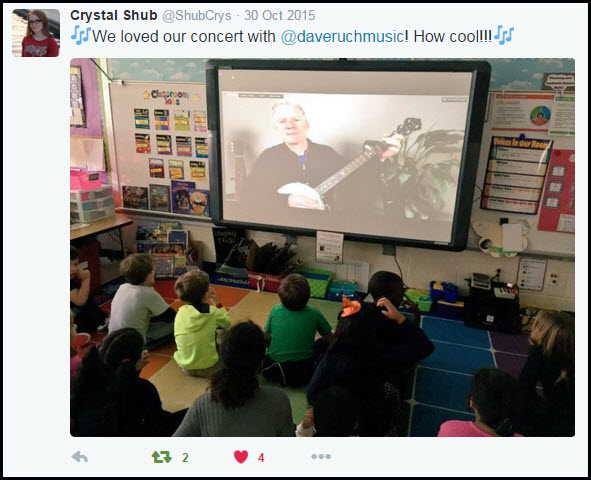 There are dozens of free and inexpensive tools out there to help you capture these quotes. I use a program called SnagIt to take simple screenshots of positive tweets and Facebook comments.
There are dozens of free and inexpensive tools out there to help you capture these quotes. I use a program called SnagIt to take simple screenshots of positive tweets and Facebook comments.
Once you’ve taken the screenshot, you can simply add it to your website as an image.
Again, if it’s a quote from a performing arts center where you just performed, put it on the page performing arts centers will be most likely to visit.
Happy audience quote from a children’s performance you gave? Put it on the page that describes your shows for kids.
This is powerful marketing. Their words are GREATER THAN your words.
One More Way to Use Social Proof
If you have a huge follower count on social media, or a large number of cumulative website visitors, or YouTube views, or social media shares…that’s all social proof too!
Find a way to display those numbers on your website.
There’s a certain American chain restaurant that you may have seen doing this…

OK, Now Over to You
How are you using social proof? I’d love to hear what’s been working and what you’ll be trying next. Just leave me a note in the Comments section below!
About The Blog
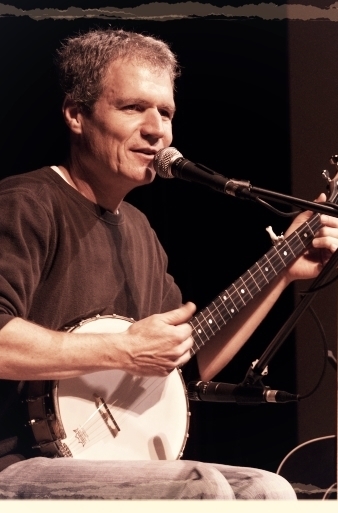 Since leaving a white-collar marketing job in 1992, Dave Ruch has been educating and entertaining full-time in schools, historical societies and museums, folk music and concert venues, libraries, and online via distance learning programs.
Since leaving a white-collar marketing job in 1992, Dave Ruch has been educating and entertaining full-time in schools, historical societies and museums, folk music and concert venues, libraries, and online via distance learning programs.
Along the way, he’s learned a great deal about supporting a family of four as a musician.
The Educate and Entertain blog provides articles, tips, encouragements, and how-to’s for regional performers (in any region) interested in making a great full-time living in the arts.



Love this post. Thank you!
Curious, what else do you use Snagit for?
Hey Lenore – I use it just about every day for something. Any time I want to screenshot something and send it to someone.
Hi Dave,
I’m a little slow catching up on your articles because I just opened a new business. It’s my husband who is the music maker in the family, but I enjoy your articles and pass them on.
Whatever the subject, you always give helpful advice that is easy to follow. In fact, I can even apply it to my t-shirt shop on Etsy.
Just had to send a little love and appreciation your way for all the work you put into this blog.
Have a wonderful Thanksgiving.
Thank you so much for checking in here Naomi – I’m so glad you are getting good value out of the blog! Happy thanksgiving to you as well…
Great article! A few words go a long way. My 1st album, El Samuriachi, got a very nice write up in Guitar Player Magazine and to this day I still put a sticker on the CD packaging that says (with their permission of course) … “Chris Dunnett El Samuraichi. Flamenco- and classical-flavored originals delivered by a fleet-fingered master technician with a flair for melody and
composition.”
… Shawn Hammond, Guitar Player Magazine
I have no doubt that has helped a little 🙂
Awesome Chris, thanks for sharing that.
Thanks for the great advice Dave. I’ve been doing a lot of gigs at the same local restaurant and each gig has gone well and was well received. I never thought of asking them for a testimonial in my thank you notes I send to them. What a great idea!
Is there any way I can kidnap musos and lock them in a room and not release them until they’ve read your article and able to recite it!
Mind you for many musos that would not be enough as they’re too damn lazy and think that all they need is their music and everyone is gonna beat a path to their door!
How do you REALLY feel Frank?!
whatever happened to “can he play”?
That’s social proof too, Richard. Find instances of someone credible saying that about you, and then make sure people see it.
Still laughing over how you quoted yourself! That was great. First time I’ve seen that done. Think I’ll STEAL that idea!
Thanks again Dave & I’m glad I found your blog!
Glad to be of some amusement Steve!
I laughed about that too! So funny.
Dave, I have been enjoying these immensely. A tip I used from the last one got my Irish band a major gig. Woooo, just like that.
You mention not to have a “What Others Say” page on your website – 2 of my sites have them and they are so fun (read and you will understand). It tells folks that I have a sense of humor and am not stuck on myself. But it doesn’t say what you think it will when you click on it.
Hey Roland – you can slip my commission check in the mail anytime this week! Seriously though, that’s great news. We’d all love to hear what you did, so feel free to share here if appropriate.
As for your “What Others Say” page, I have seen one of them and it’s very fun and well done. If you’re using Google Analytics (I hope you are), it would be fun to look into your website stats for the past few months and see how many people are visiting those pages, and how long they’re staying there.